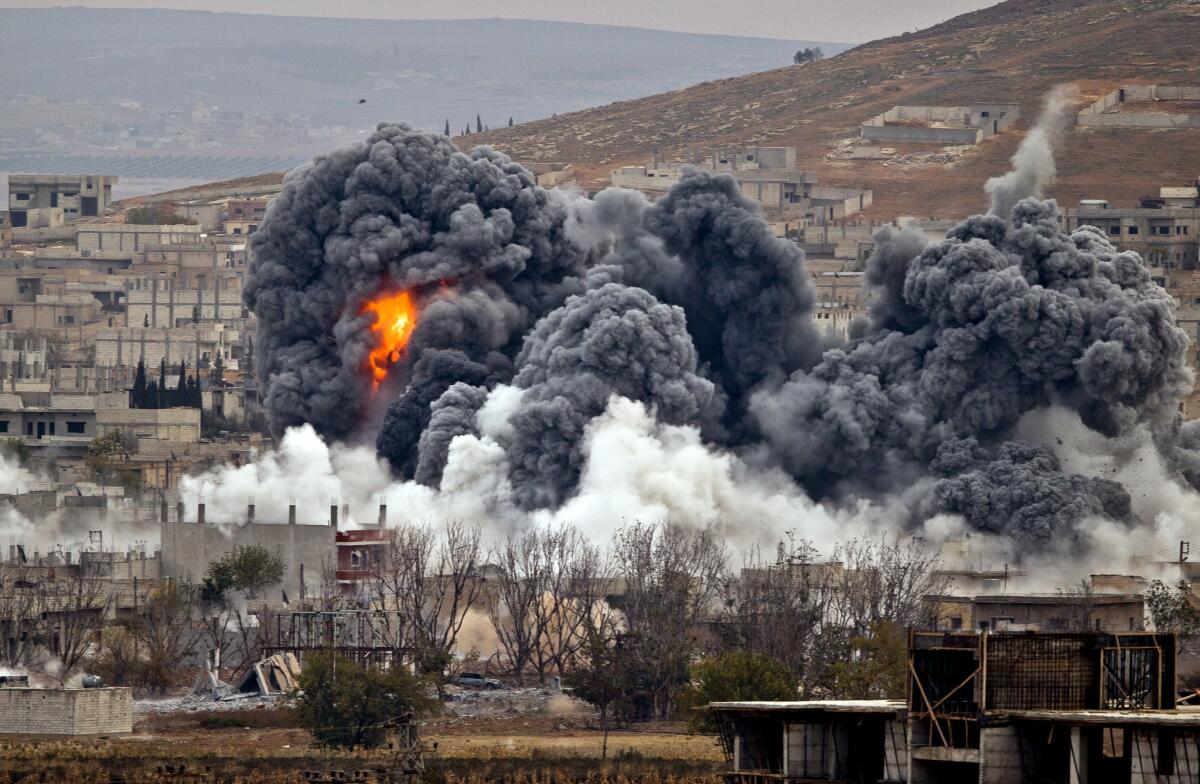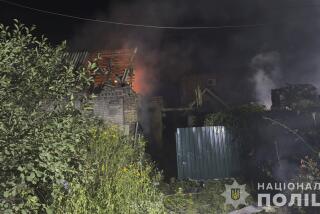Kurds say Islamic State militants near defeat in Kobani

- Share via
Reporting from Suruc, Turkey — Kurdish forces say the battle against Islamic State for control of the Syrian border city of Kobani has turned definitively in their favor following weeks of punishing U.S.-led airstrikes and the arrival of Kurdish reinforcements from Iraq.
Commanders belonging to the Popular Protection Units – YPG, by its Kurdish initials – said the intensive bombardment in recent days had allowed their fighters to seize several strategic hills from Islamic State militants.
The U.S Central Command on Monday reported nine new airstrikes in the Kobani area, hitting Islamic State fighting positions, staging areas and one “tactical” militant unit.
About 250 Islamic State fighters remain in Kobani, concentrated in the southeastern corner of town, Rafiq Baradar, a YPG commander from Kobani, said during a visit to the Turkish border town of Suruc.
“They will probably be finished in four or five days,” Baradar said in an interview here.
But the Kurds say it will likely take weeks and possibly months to clear traces of the militants from the area, in part because of lingering snipers, roadside bombs and explosive-rigged buildings. Islamic State also seized scores of villages outside Kobani that must be secured, the Kurds note.
“Daesh is not retreating as much as we want, but it is retreating,” said Anwar Muslim, a political leader in Kobani reached by telephone, who used the Arabic acronym for Islamic State. “The initiative is now with the YPG and the coalition’s air power.”
Many Kurds in the region and elsewhere view the fight for Kobani, also known as Ayn al-Arab, as a global symbol of resistance against Islamic State’s extreme interpretation of Islam. The Kurdish militia defending Kobani has a strong secular orientation.
Islamic State is reported to have lost hundreds of fighters in the two-month siege of Kobani, situated just south of the Turkish border. A defeat in Kobani would be a major strategic blow for the militants, who have also seen their advances in Iraq stall in recent weeks.
Last weekend, Iraqi forces said they had opened a corridor to the long-besieged oil facility at Beiji, the nation’s largest refinery, situated north of Baghdad, the capital.
Kobani’s defenders, reinforced with 150 Kurdish peshmerga fighters from Iraq, have brought heavy machine guns mounted on the back of pickup trucks to several hills dotting the south and east of the city, including Mt. Mishtenur. The strategic mountain overlooks a road leading south to the Syrian city of Raqqa, Islamic State’s de facto capital. The U.S. air cover has also made it more difficult for Islamic State to bring in reinforcements, the Kurds say.
“The airstrikes have allowed us to capture the hills,” said Nareen Khalil, 19, one of many female fighters with the Kurdish forces in Kobani.
“As soon as my wound heals, I will go back to Kobani to fight and die there,” said Khalil, who was recovering from a bullet to the abdomen sustained in Kobani.
Several of her women comrades were captured by the militants and beheaded, she said.
Though Turkish authorities have officially sealed the border, YPG commanders say that every day as many as 50 Kurdish supporters sneak across the border near Suruc to join Kobani’s defenders. Meantime, wounded are brought to Turkey for treatment.
Kurdish commanders in Kobani say they are providing U.S. personnel with coordinates to be targeted in the airstrikes. The Pentagon has also dropped weapons and other supplies by air, though Islamic State and the Kurds say some items mistakenly ended up in the hands of the militants.
More than 200,000 people, mostly ethnic Kurds, fled the Kobani area as militant forces approached the city outskirts two months ago. Fearing a massacre, many took refuge in Suruc and elsewhere in Turkey. Most live in camps where they are provided hot food, makeshift schools and tents with electricity.
Kurdish officials say they hope all will be able to return to Syria once militants have been pushed out of the area.
“We don’t want to have booby traps and snipers” when the residents return, explained Anwar Muslim, the Kurdish political leader in Kobani.
Farooq is a special correspondent. Times staff writer Patrick J. McDonnell and special correspondent Nabih Bulos in Beirut contributed to this report.
Follow @mcdneville on Twitter for news out of the Middle East
More to Read
Sign up for Essential California
The most important California stories and recommendations in your inbox every morning.
You may occasionally receive promotional content from the Los Angeles Times.









